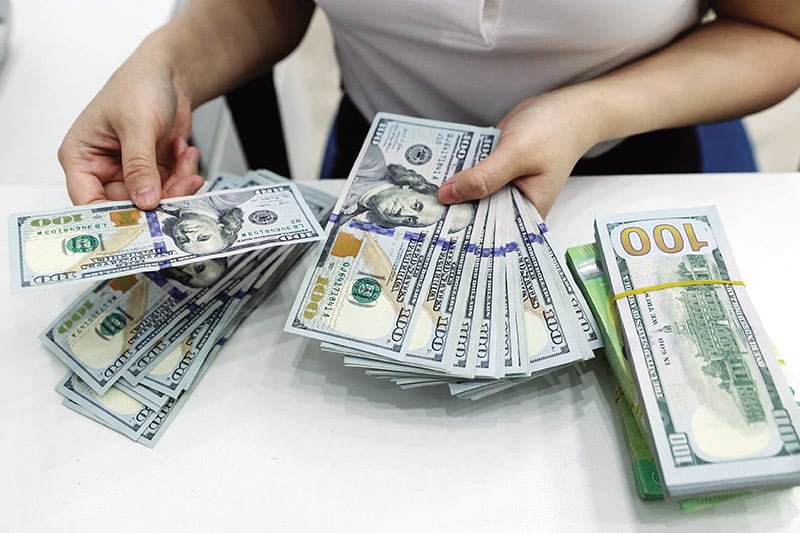 |
| According to many experts, the current time is quite favorable to issue USD bonds. |
It is difficult to target the domestic market.
At the meeting of the Steering Committee for restructuring credit institutions and handling bad debts, held in early August, Deputy Prime Minister Ho Duc Phoc directed the State Bank to research and advise on solutions for issuing bonds in USD.
Mr. Tran Ngoc Bau, CEO of WiGroup (a company providing economic and financial data) said that the above policy is an effort to find a solution to both mobilize USD from the people and limit negative impacts on the exchange rate. If successfully mobilizing foreign currency bonds from the people, in case there is a need for USD to pay foreign debts, this source will not put too much pressure on the banking system as well as the foreign exchange market.
In the first half of this year, the State Treasury had 11 foreign currency purchase offers from commercial banks, with a total value of about 1.9 billion USD. This is one of the reasons for the pressure on the exchange rate, causing the VND to continue to depreciate against the USD, despite the sharp decline in the USD Index on the world market.
So far, the State Bank has not had any further information on the issuance of USD bonds, but experts have very different opinions on this issue.
Speaking to a reporter from Dau Tu Newspaper, an economic expert said that issuing bonds in USD, if aimed at the domestic market, would be very difficult, for the following reasons:
Firstly, the amount of foreign currency in the population may not be much, because recently, due to the 0% USD deposit interest rate policy, many people have converted from USD to VND.
Second, according to current regulations, individuals are not allowed to buy government bonds (G-bonds), while credit institutions - the main buyers of G-bonds today - also find it difficult to participate in buying USD government bonds, because banks themselves are also short of foreign currency, not to mention the issuance term of Government bonds is often very long.
Third, regarding interest rates, if domestic USD bonds are issued at low interest rates, they will not be successful, but if they are issued at high interest rates, they will cause dollarization to increase again, putting pressure on the exchange rate.
According to this expert, issuing bonds in USD would be more feasible if applied to international investors. However, the interest rate for mobilizing USD bonds in the world is not cheap at present.
Using addressable capital to optimize international fundraising options
Economic experts point out that Vietnam's demand for infrastructure investment capital in the coming period is very large, therefore, issuing construction bonds in VND or foreign currency is reasonable, helping the State have more resources to offset the budget deficit, without affecting interest rates in the market and targeting international investors will be more feasible than domestic investors.
In the past, Vietnam had 3 rounds of USD bond issuance (round 1 in 2005 - 2006; round 2 in 2010 and round 3 in 2014).
 Mr. Tran Ngoc Bau, CEO of WiGroup, said that the research on issuing bonds in USD can be applied to both domestic and international investors. Both forms help reduce exchange rate pressure during the period when Vietnam needs USD in the short term.
Mr. Tran Ngoc Bau, CEO of WiGroup, said that the research on issuing bonds in USD can be applied to both domestic and international investors. Both forms help reduce exchange rate pressure during the period when Vietnam needs USD in the short term. 
According to Mr. Nguyen Minh Tuan, General Director of AFA Capital, the current time is quite favorable for issuing USD bonds. The reason is that the Government's foreign debt ratio is quite low and under control, so Vietnam still has a lot of room to borrow foreign debt. In addition, Vietnam's national credit rating has improved significantly (the world's leading prestigious organizations such as Fitch Ratings, S&P and Moody's have all upgraded Vietnam's credit rating), helping Vietnam have the opportunity to mobilize international capital at cheaper costs. In addition, USD interest rates on the international market tend to decrease (the US Federal Reserve is likely to continue to reduce interest rates next September).
From the above analysis, Mr. Nguyen Minh Tuan commented that issuing USD bonds not only adds capital to the economy, reduces pressure on interest rates, but also helps increase national foreign exchange reserves.
However, when issuing USD bonds, experts also warn of many challenges. In the context of the current exchange rate pressure, borrowing more in USD will put more pressure on the exchange rate. Although Vietnam's national credit rating has improved, it is still in the group recommended for speculation rather than investment, which causes Vietnam to still have to pay quite high interest rates when mobilizing USD bonds. According to experts' estimates, referring to the current 10-year USD bond interest rate of the US plus Vietnam's risk margin, Vietnam is likely to have to mobilize USD bonds at an interest rate of 6-7%/year (not taking into account the depreciation of VND).
Therefore, although supporting the option of issuing USD bonds to supplement resources for the economy in the context of large investment needs, experts recommend that the Government needs to clearly define the purpose of capital calling in order to have an effective capital calling plan.
Mr. Phan Le Thanh Long, founding Chairman of AFA Capital, said that if capital is mobilized for sustainable development projects and green projects, it is possible to achieve better interest rates and longer terms.
In addition, experts also recommended that the Government strengthen communications to help the world see a Vietnam with stable growth, with tools to stabilize exchange rates, interest rates, public debt, and national risks at medium to low levels. At the same time, attention should also be paid to improving the national credit rating, because this factor is directly related to the Government's borrowing interest rates.
Source: https://baodautu.vn/phat-hanh-trai-phieu-bang-usd-huy-dong-ngoai-te-trong-dan-hay-nham-vao-nha-dau-tu-ngoai-d364162.html






![[Photo] Cat Ba - Green island paradise](/_next/image?url=https%3A%2F%2Fvphoto.vietnam.vn%2Fthumb%2F1200x675%2Fvietnam%2Fresource%2FIMAGE%2F2025%2F12%2F04%2F1764821844074_ndo_br_1-dcbthienduongxanh638-jpg.webp&w=3840&q=75)

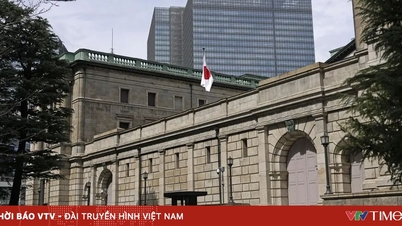





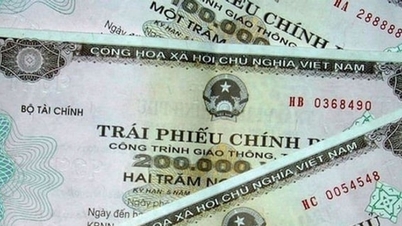





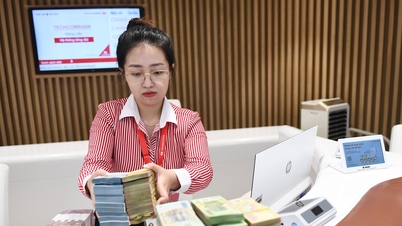

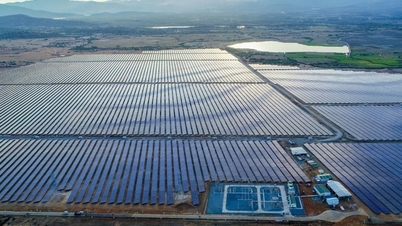



















































































Comment (0)